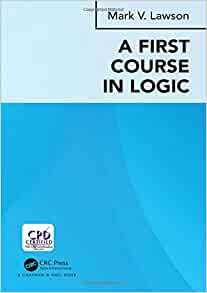This is the errata page for my book
published in December 2018


| Name |
Typos |
| Hind Zantout |
Examples
1.3.5(1). An extraneous negation sign has found its way
into the formula in the truth table. Erase it. Due
to printer's devil. |
| Hind Zantout |
Examples
1.4.15 refer to Example 4.1(1) this should be Example
1.4.4(1). |
| Alexander
Evetts and Paul Klinsberg |
Exercises
2.2, Question 13. The final symbol in the equation should
be an x not a y. |
| Calum Wyness |
Question 4 of Exercises
3.1. The notation used in the solution does not match that
used in Example 3.1.4. In fact, you need to refer to
Example 3.1.19. The first-order language of logic used has
two 1-place predicate symbols A and B and two 2-place
predicate symbols P and Q. The formulae have to be written
in this language. The formulae you write down are then
interpreted as the given relations in the family tree. |
|
Mahsa T Manzari
|
Page 51. Example 1.8.8.
There are two typos in the second displayed logical
equivalence. In the third brackets, there should be no
negation in front of the atom z. In the fourth brackets,
the conjunction should be a disjunction. |
| Jennie Hansen |
Page 164. I(X)[d] should
read I(X_{1})[d] in both (b) and (c). |
| Euan Aitken | Solution to Exercises 1.3 Question1(a). The truth assignment leading to F is P=T, q=F and r = T (the value for r is missing). |
| Aaron Molesbury | Solution to Question 1 of Exercises 1.5. The penultimate connective in the solution should also be a conjunction. |
| Raul Alonso Gonzalez | Page 204. Solution to part (c) of Question 3 of Exercises 1.6. The second column labelled nand should be labelled nor. |
| Jolene Stout | Question 2(l) of Exercises 3.1. The solution has an `e' where it should have a `c'. |